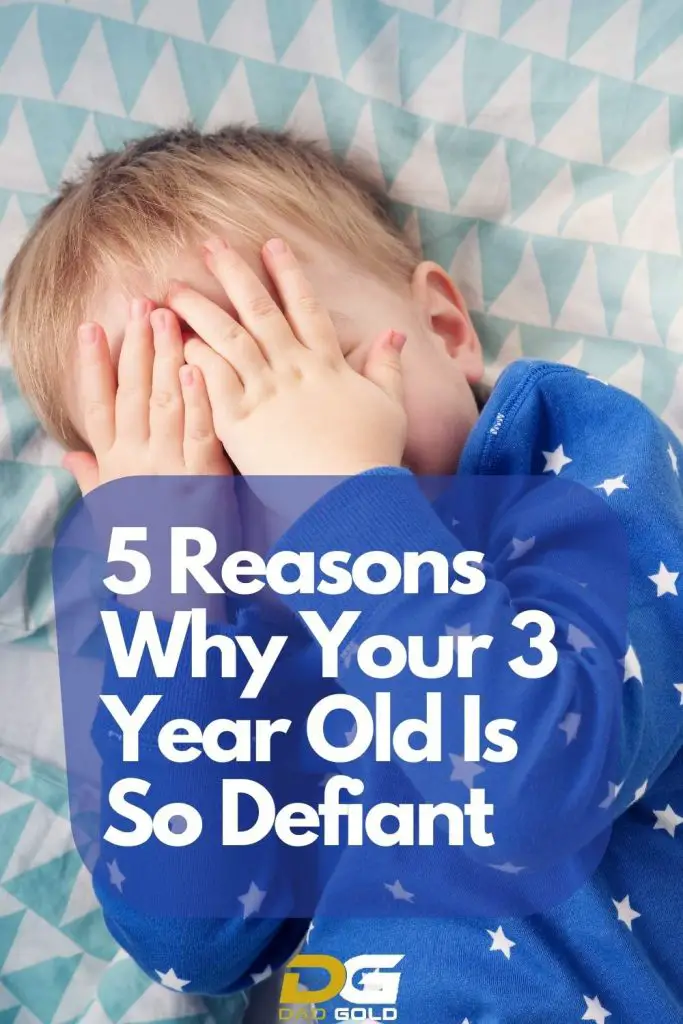Parenting a toddler is one of the biggest responsibilities a person can shoulder.
A defiant 3-year-old child especially can be a handful.
Just imagine yourself as a 3-year-old. You’ve just begun talking and interacting with people with the language you’ve only recently acquired; you’ve started to understand just how much independence you can have as a person- to explore, question, and throw tantrums!
You’re likely going to be defiant to a ‘t.’
Here are 5 reasons why you have a defiant 3-year-old.

Tips for dealing with a defiant toddler
On average, a toddler at age 3 has the capacity to understand things but is still unfamiliar with how things work. This makes it hard for them to cope with situations that don’t make sense to them or don’t go their way.
Being defiant is absolutely normal and part of a developmental stage.
It is important to note that the level of defiance amongst toddlers differs, as some toddlers are more prone to defiance issues than others.
On the most end, children with such problems are diagnosed with Oppositional Defiant Disorder (ODD). There are certain criteria for a child to be diagnosed as having ODD. It is not a simplistic diagnosis where any child who shows signs of defiance is diagnosed as ODD. Check with a clinician if you think this may be the case for your situation.
-

Bold Male Pride – Baseball Trucker Cap Celebrating Masculinity
£18.00 Select options This product has multiple variants. The options may be chosen on the product page -

Dad Bod Appreciation Gift Mug
£14.00 Add to cart -

Dad Bod, Bad Jokes Structured Baseball Cap
£22.00 Select options This product has multiple variants. The options may be chosen on the product page
Whatever the extent of defiance, however, there are underlying reasons for your child’s behavior; understanding this and dealing with it will help you and your child make the best of this experience.
Now that you can roughly grasp where a toddler’s defiance stems from and the nature of it, here are some tips on the best way to deal with a defiant toddler.
Defiant behavior in 3-year-olds, the 5 tips.

Children are highly emotional beings, and dealing with them with empathy while being reasonable and logical will benefit their development in many ways. It will help them understand your requirements for them as a parent and create a healthier dynamic between you.
Before the tips, remember that the best thing you can do is set expectations. If your toddler knows what you expect from them, it will lay the foundations of your discipline strategy.
Here are some tips on discipline for defiant behavior in 3-year-olds.
Validation of your child’s feelings
The first thing you need to do is give your child a sense of security.
It would be best if you let them know that you are capable of understanding their defiance. When you can make them feel secure, they are more likely to open up and communicate instead of throwing tantrums out of frustration.
This is one of the most important steps you need to make sure you follow. This will improve the quality of your relationship with your toddler as reasonable and empathetic.
Set limits; and without anger
Rules and boundaries are essential to make your interactions with your toddler reasonable. You can lay down the limits and explain why they’re kept in place.
Beginning with a conversation is a great way to make them feel capable of making the right choice instead of forcing them to comply.
If your toddler is still stuck on being defiant, you can try being a little sterner or experiment with the strategies listed below.
Some reasonable flexibility
Give your toddler options and allow them the agency to choose between them. Take this, for instance; your kid is hell-bent on going nowhere near vegetables. Well, give her options. She can’t possibly dislike all vegetables.
If she doesn’t like green beans, try giving her peas or carrots. You first need to make your kid understand that eating veggies are healthy.
Then it would help if you made your stand on eating vegetables clear and non-negotiable.
After this, your kid will consider the available options to choose from as a reasonable compromise.
Make things interesting
This is the magic ingredient behind successful parenting. Kids at age 3 are almost entirely oblivious to how things work in reality, and you can use this to your advantage.
They have an overactive imagination, and if you can tap into that while trying to make them comply with your instructions- you’re good as gold.
Let’s talk about vegetables again. Your kid doesn’t want to go anywhere near it. Tell him to imagine it’s an alien trying to invade the planet, and the only way to save the world from destruction is by eating it!
Act it out so your kid is so engrossed in the performance that the vegetables stand no chance.
Give them some independence.
As your child grows each day, they will need to learn to deal with certain things themselves to help them mature as human beings.
Here’s an example.
Your kid had lost her favorite plush pony. She’s lost it because she doesn’t have the habit of tidying up her room. Little pony is lost in a heap of toys and costumes.
This is a big deal because she loves the pony, making her happy; it’s her friend.
So, what do you do about it?
The bottom line is your kid is not in grave danger because her pony is unlocatable. You need to empathize with your kid and let her know that you understand her problem and that you are there to support her.
Next, reinforce her capability to ‘rescue’ her pony. This will empower her and make her think twice about leaving her room in shambles again.
Is it normal for a 3-year-old to be defiant?

Absolutely! Being defiant is part of your toddler’s development. They are pushing boundaries; your boundaries.
Kids want to know what they can and cannot get away with, so there is no need to worry.
Your job is to mitigate this behavior and address it as soon as it begins.
Conclusion
Your child is your most precious asset, and it is your responsibility to ensure that they are nurtured correctly. Each child is different and requires different types and levels of discipline.
However, there is one common thing that all kids need, and that is empathy.
Understanding why your 3-year-old behaves as they do is essential to successful parenting.
Love your kid the smart way with positive disciplining and reduce the chances of constant defiance.
Good luck!


